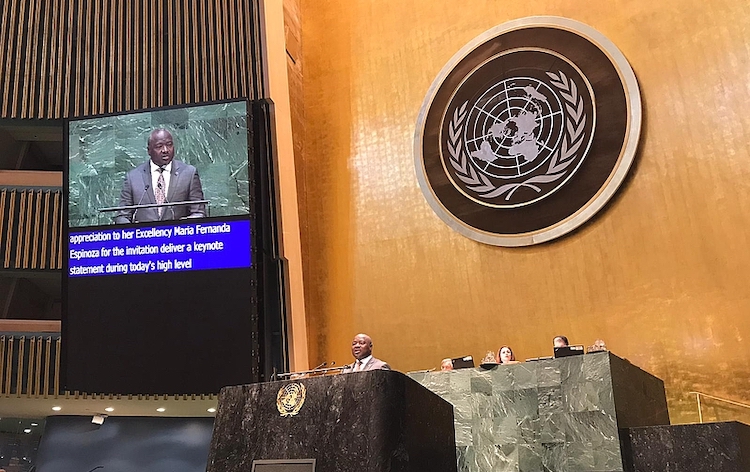By J Nastranis
NEW YORK (IDN) – Ten years ago, on December 2, 2009, the 64th session of the United Nations General Assembly declared August 29 the International Day against Nuclear Tests by unanimously adopting resolution 64/35. The resolution was initiated by the Republic of Kazakhstan, together with a large number of sponsors and cosponsors with a view to commemorating the closure of the Semipalatinsk Nuclear Test site on August 29, 1991. [2019-09-13 | 15] ARABIC | JAPANESE
The 74th session of the General Assembly convened a High-Level Meeting on September 9, 2019 as follow-up on events worldwide on August 29, the official International Day against Nuclear Tests. That day is highly symbolic: it is the anniversary of Kazakhstan’s closure of the former Soviet Semipalatinsk nuclear test site in 1991, and the date the first Soviet nuclear test was conducted there in 1949.
The resolution calls for increasing awareness and education “about the effects of nuclear weapon test explosions or any other nuclear explosions and the need for their cessation as one of the means of achieving the goal of a nuclear-weapon-free world.”
Moreover, “convinced that nuclear disarmament and the total elimination of nuclear weapons are the only absolute guarantee against the use or threat of nuclear weapons,” the General Assembly designated September 26 as the International Day for the Total Elimination of Nuclear Weapons, which is devoted to furthering the objective of the total elimination of nuclear weapons, through the mobilization of international efforts.
The international instrument to put an end to all forms of nuclear testing is the 1996 Comprehensive Nuclear-Test-Ban Treaty (CTBT). But it has yet to enter into force. Because eight states have not ratified the treaty: China, Egypt, Iran, Israel and the United States (which have signed the Treaty), India, North Korea and Pakistan (which have not signed it).
CTBT bans all nuclear explosions – everywhere, by everyone. The Treaty was negotiated at the Conference on Disarmament in Geneva and adopted by the UN General Assembly. It opened for signature on September 24,1996. Since then, it has reached near-universality: with 184 countries having signed and 168 countries having ratified the Treaty.
When the Treaty enters into force it provides a legally binding norm against nuclear testing. The Treaty also helps prevent human suffering and environmental damages caused by nuclear testing.
In his opening remarks to the High-Level Meeting, UN Secretary-General António Guterres noted that the CTBT is one of the most widely supported treaties and that its verification mechanism—the International Monitoring System—has helped facilitate peace and security. He urged the eight states whose ratification of the Treaty is still required for it to come into force to do so urgently.
“In the 21st century, nuclear testing is simply not acceptable,” Guterres said, pointing to its grave human and environmental impacts. “And it is not acceptable to prevent the entry into force of the CTBT and, thereby, withhold a valuable restraint on the qualitative and quantitative proliferation of nuclear weapons and a practical step towards their total elimination.”
As the Secretary-General recognized in his disarmament agenda Securing our Common Future launched on May 24, 2018, the norm against testing is an example of a measure that serves both disarmament and non-proliferation objectives. By constraining the development of advanced new types of nuclear weapons, the CTBT puts a brake on the arms race. It also serves as a powerful normative barrier against potential States that might seek to develop, manufacture and subsequently acquire nuclear weapons in violation of their non-proliferation commitments.
“The CTBT is a crucial, and long overdue, step that will help to ensure the continued vitality of the international nuclear non-proliferation and disarmament regime,” said CTBTO Executive Secretary Lassina Zerbo. “If we work together, I am confident we can achieve this noble aim. Let us mark this International Day against Nuclear Tests by strengthening our commitment to put an end to nuclear tests.”
In his keynote speech, CTBTO Executive Secretary Lassina Zerbo noted that the International Day against Nuclear Tests provides an opportunity to send a clear and unmistakable message to the international community that our work is not yet done.
“The business of ending nuclear tests for all time remains unfinished,” Zerbo added. “It is my hope that today’s commemoration will help to inspire countries to take concrete measures that will allow us to finally reach our objective of a world free from the dangers of nuclear testing. And the only path that will lead us to this noble goal is through the verifiability of the CTBT and its universalization.”
Zerbo commended the courage and leadership of Kazakhstan’s First President Nursultan Nazarbayev, who made the historic decision to renounce the possession of nuclear arms, send former Soviet nuclear warheads in Kazakhstan to Russia, and permanently close the Semipalatinsk nuclear test site.
He also paid tribute to the bravery and determination of the people of Kazakhstan—scientists, civil servants, artists and ordinary citizens – who were affected by the nearly 500 nuclear tests carried out at Semipalatinsk, and who played an important role in the closing of the test site.
“Today, we honour the memory of all victims of nuclear tests and pay our respects to those whose lives have been adversely affected. We owe it to them, and to generations unborn, not to repeat the horror of nuclear tests and nuclear weapon explosions,” said María Fernanda Espinosa Garcés, outgoing President of the General Assembly.
She opened the meeting by noting that “the adoption of the Comprehensive Nuclear-Test Ban Treaty by the General Assembly in 1996 was an important moment in our quest for disarmament”. The UNGA President urged the remaining Annex 2 states to ratify the CTBT, “so that this crucial treaty can enter into force”. [IDN-InDepthNews – 13 September 2019]
Photo: CTBTO Executive Secretary Lassina Zerbo addressing UN General Assembly High-Level Meeting on 9 September 2019 to commemorate and promote the International Day against Nuclear Tests (29 August). Credit: CTBTO




